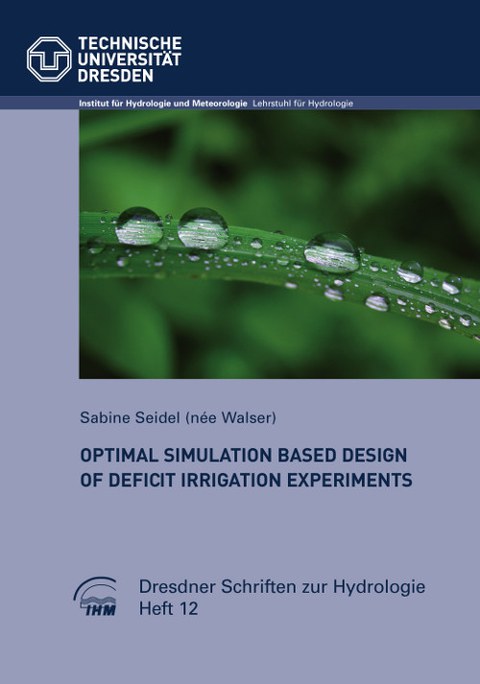Booklet 12
Optimal simulation based design of deficit irrigation experiments
by Sabine J. Seidel, née Walser (2012)
Abstract: There is a growing societal concern about excessive water and fertilizer use in agricultural systems. High water productivity while maintaining high crop yields can be achieved with appropriate irrigation scheduling. Moreover, freshwater pollution through nitrogen leaching due to the widespread use of nitrogen fertilizers demands for an efficient nitrogen fertilization management. However, such a resource-efficient crop management requires good knowledge of soil water and nitrogen dynamics as well as of crop water and nitrogen demand.
Crop growth models that describe physical and physiological processes of crop growth as well as water and matter transport, are considered to be powerful tools to assist in the optimization of irrigation and fertilization management. It is of a general nature that the reliability of simulation based predictions depends on the quality and quantity of the data used for model calibration and validation obtained e.g. in field experiments. A lack of data or low data quality for calibration and validation may cause low model performance and large uncertainties in simulation results. The large number of model parameters that have to be calibrated requires appropriate calibration methods and a sequential calibration strategy. Moreover, simulation based planning of the field design saves expenditure while supporting maximal outcomes of experiments. An adjustment of crop growth modeling and experiments is required for model improvement and development to reliably predict crop growth and to generalize simulation results.
In this research study, a new approach for simulation based optimal experimental design was developed aiming to integrate simulation models, experiments, and optimization methods in one framework for optimal and sustainable irrigation and nitrogen fertilization management. The approach is composed of three steps:
- The preprocessing consists of the calibration and validation of the crop growth model based on existing experimental data, the generation of long time-series of climate data, and the determination of the optimal irrigation control.
- The implementation comprises the determination and experimental application of the simulation based optimized deficit irrigation and nitrogen fertilization schedules and an appropriate experimental data collection.
- The postprocessing includes the evaluation of the experimental results namely observed yield, water productivity (WP), nitrogen use efficiency (NUE), and economic aspects, as well as a model evaluation.
Five main tools were applied within the new approach: an algorithm for inverse model parametrization, a simulation model for predicting crop growth, water balance and nitrogen balance, an optimization algorithm for deficit irrigation and nitrogen fertilization scheduling, and a stochastic weather generator. Furthermore, a water flow model was used to determine the optimal irrigation control functions and for simulation based estimation of the optimal field design.
The new approach was applied within three case studies presented in this research study. Beyond the implementation of the approach, case study I focused on model parameter transfer from field to greenhouse conditions and the estimation of yield and WP potentials. Case study II dealt with real-time deficit irrigation scheduling and the determination of the maximal profit due to an optimal field design. In case study III, the simultaneous simulation based optimization of deficit irrigation and deficit nitrogen fertilization schedules was investigated. The implementation of the approach within the three case studies increased grain yields by 12 %, WP by 16 to 41 %, NUE up to 76 % and profit by 27 %.

